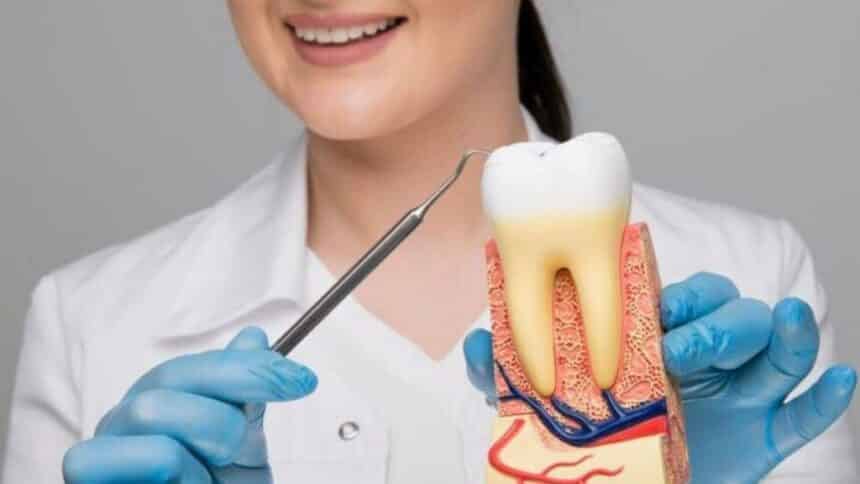The enamel of our teeth does not have it easy with us - inadequate diet, deficiencies in oral hygiene, aggressive whitening. All this has an impact on the demineralisation of enamel. Find out what enamel remineralisation is, i.e. how to strengthen tooth enamel and thus enjoy a beautiful and healthy smile.
Demineralisation of enamel
Tooth enamel is the hardest tissue in our body. It forms the protective layer of our teeth. Unfortunately, it is exposed to almost constant contact with agents that damage it, so that cavities develop in the enamel and enamel remineralisation is necessary.
Such cavities usually first manifest themselves as hypersensitivity to heat and cold. Sometimes even breathing in cold air then causes discomfort. You can read more about the causes of hypersensitivity in our article "How to treat tooth sensitivity and where it comes from".
Enamel cavities very often look like white spots on the teeth. They are often rough and dull, not like healthy enamel. Do not underestimate this symptom, as it can also be a sign of fluorosis or hypoplasia. Read more about such tooth discolouration in our post "White spots on teeth - what they mean and how to get rid of them„.

How do you strengthen your enamel? Address the causes in the first instance
And what are the causes of enamel demineralisation? Most often, it is the resultant of several factors. Firstly, poor eating habits. A diet rich in sugars promotes enamel demineralisation. Limit your consumption of particularly sweetened drinks. Let your diet be rich in calcium, which promotes the remineralisation process of enamel. It is also a good idea to give up snacking so that the pH in your mouth has a chance to return to normal levels.
The second most common reason for enamel cavities is inadequate hygiene oral cavity. A very common mistake, especially made by parents, is to choose fluoride-free toothpastes for children. This is a big mistake. Fluoride-containing toothpastes should already be used from the first tooth. Children can also develop cavities in their enamel, which leads to tooth decay, which in turn spreads extremely quickly in children. You can read more about fluoride in the text "Does fluoride in toothpaste harm„.
It is necessary - in both children and adults - to brush with fluoride toothpaste at least twice a day. The second time should be after the last meal of the day, this is important. But brushing alone is usually not enough. The interdental spaces should also be cleaned. We recommend choosing fluoride-coated dental floss. You can read more about the benefits of flossing in our post "How to floss your teeth and why it's so important„.
A less common, but still frequent cause of demineralisation enamel is to aggressively whiten them. Very often, when we opt for home remedies to whiten our teeth, we have no idea that many of them actually wear down our enamel. And damaged enamel is susceptible to staining, so it's a vicious circle. Teeth whitening should be done under the guidance of a dentist. You can read more about whitening at home here.

Enamel remineralisation, or how to strengthen tooth enamel?
In addition to reducing the causes we have written about above, you can use special toothpastes and rinses at home to remineralise your enamel. You can strengthen your tooth enamel in this way, but only if it is the early stages of demineralisation of your enamel.
If stains have appeared on your teeth, dull, rough spots - you will probably need visits to the dentist. Sandblasting will be carried out, followed by fluoridation to restore the enamel. If necessary, he will remove your tartar first. Read more about these treatments here: "Dental hygiene in the UK - scaling, tooth sandblasting, polishing and fluoridation„.
Sandblasting and fluoridation will not only remove any discolouration that has occurred, but will also protect your teeth from further damage and decay. Remember, however, that if you do not implement the right changes in your eating habits and oral hygiene, the enamel may again deteriorate and remineralisation of the enamel will then be necessary.
In our dental office for scaling, sandblasting and varnishing you will pay £140. If you would like something else done on the occasion and the payment is over £350, you can take advantage of 0%'s 12 instalments. Our instalment scheme is governed by Financial Conduct Authority (FCA number 619628).

